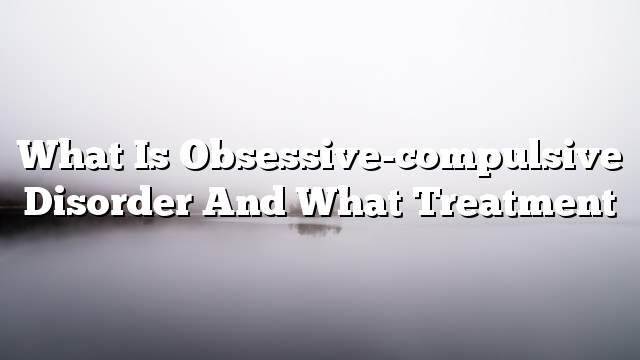Obsessive-compulsive disorder
Obsessive-compulsive disorder (OCD) is a chronic and common psychological problem; the patient feels the urgent need to perform certain behaviors frequently and compulsively out of control and will, and to inform the patient of frequent concerns and thoughts that cause him anxiety. Obsessive-compulsive disorder can consume this alarm system, as if it stimulates the alarm system by any cause, regardless of its size as an absolute threat or a catastrophic threat, while it should be stimulated only When there are real reasons and dangers that require this, this problem may cause the affected person to affect all aspects of life such as: work, study, social relations, and others.
Obsessive-compulsive disorder symptoms and signs
Symptoms and symptoms associated with obsessive-compulsive disorder may occur and may improve or worsen with time. Frequent and urgent thoughts and concerns that may occur in an individual with obsessive-compulsive disorder that may cause concern are fear of contamination or germs, and ideas about forbidden or forbidden things such as sex thoughts , Religious beliefs, harmful ideas, hostile or offensive thoughts towards oneself or others, and the desire to make things in perfect or symmetrical order, among others. As for motives and behaviors, it is obsessive cleaning or washing hands, organizing things accurately and specifically, and re-checking and check things frequently; such as making sure to close the doors again and again, the promise of things and calculated compulsively and out of will, in addition to the conduct of sudden and short Frequent and frequent eye twitching, facial tingling, and shaking shoulders or head. Obsessive-compulsive disorder (OCD) is different because the person with obsessive-compulsive disorder can not control these behaviors and thoughts even if they are aware that they are exaggerated. The person with OCD does not feel comfortable or comfortable when doing these behaviors, but it eases the anxiety caused by thoughts , And the patient spends at least one hour of his day engaged in these behaviors or ideas.
Treatment of obsessive-compulsive disorder
Obsessive-compulsive disorder is usually treated with either medication, psychotherapy, or combination therapy. Although most patients respond to treatment, some cases continue to have symptoms and symptoms. It is important to take into account when choosing treatment the presence of other psychological disorders associated with obsessive-compulsive disorder in the person.
Psychotherapy
Cognitive Behavior Therapy is one of the treatments used to treat psychological problems. One of the most effective treatments for obsessive-compulsive disorder is exposure and response prevention; the exposure section refers to thoughts or situations that raise Anxiety and triggers the onset of apprehension in the affected person. As for the prevention of the response, it is the absolute choice not to act compulsive when stimulating anxiety or obsession for some reason, and this is done under the supervision of a doctor in the beginning so that the person can exercise on this treatment himself To control the symptoms. This treatment is considered as a challenge to the person to keep up with what is really happening to him. It is very important that the patient undertakes and undertakes not to surrender and return to compulsive behaviors. Failure to do so will reduce the level of anxiety. In the level of anxiety after continuing this treatment habituation.
Drug therapy
Serotonin reuptake inhibitor is used in the treatment of obsessive-compulsive disorder. These drugs are classified as antidepressants, but not all antidepressants are effective for the treatment of obsessive-compulsive disorder. The mechanism for treating these drugs is not defined as obsessive-compulsive disorder Compulsive disorder and control only affect the presence of serotonin in the brain. The process of communication between the nerves in the brain is disrupted in cases where serotonin is not present adequately. In some cases, depression may occur as a result of obsessive-compulsive disorder. In both cases, both cases are treated by the same medication. It is important for the patient to know that these medications are not taken only when feeling stressed. They should be taken daily and regularly according to the doctor’s instructions and instructions. On a fixed level of serotonin, but 50 percent of patients stop taking the drug either because of side effects or for other reasons. It is true that if the patient has side effects of the drug, he should discuss this with the doctor to find a solution, such as changing the dose or type of medication. Seven out of 10 people with OCD respond to either drug therapy or exposure therapy.
Factors of obsessive-compulsive disorder and its complications
One of the factors that may increase or increase the risk of obsessive-compulsive disorder is a satisfactory history of this disorder in a family member such as parents. Exposure to stressful life events such as trauma may increase the likelihood of such a disorder. To stimulate thoughts, behaviors and emotional disorders of obsessive-compulsive disorder, and the reasons that may lead to the occurrence and cause of other mental disorders such as depression, substance abuse and others.
The problem of obsessive-compulsive disorder can cause other health problems such as contact dermatitis due to repeated handwashing, and may cause criminal thoughts and behaviors such as suicide and many others, ultimately leading to poor quality of life for the person who is infected.
